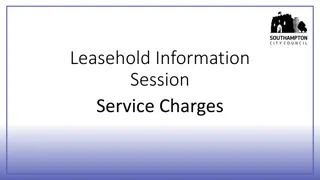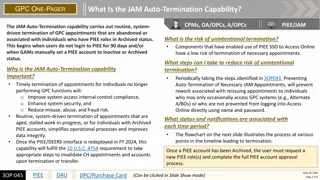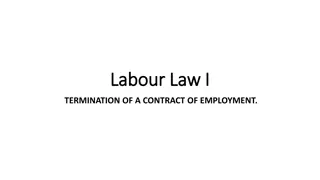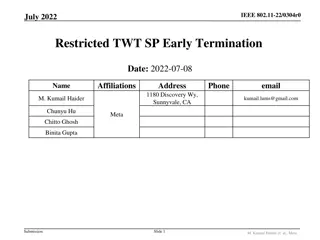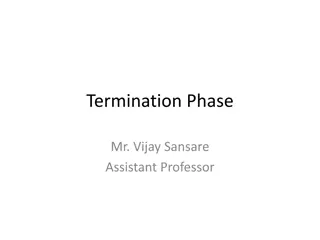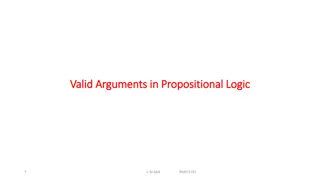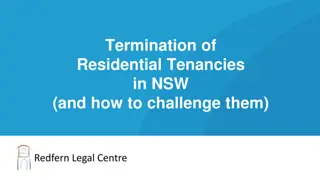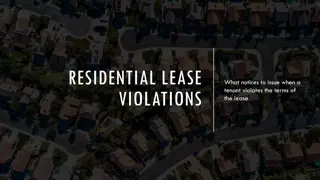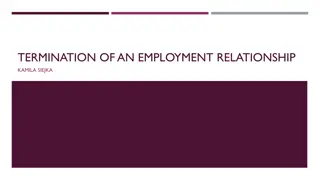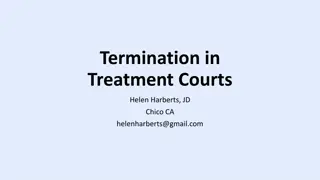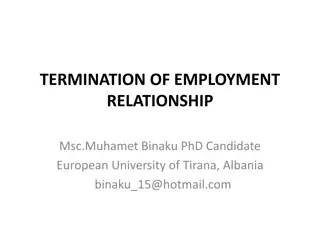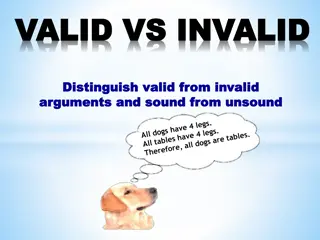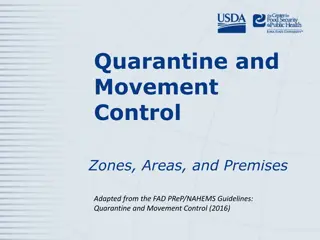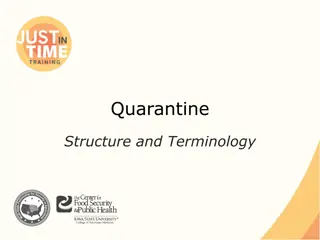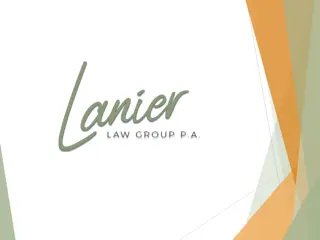Understanding Termination of Lease in Residential Premises
Explore the termination process in residential leases, covering legal regulations, succession rights, and the roles of the lessor and lessee. Discover how leases can end through various means such as termination by court, lessee, or lessor. Learn about Polish Civil Code and Acts protecting inhabitants' rights related to leases.
Download Presentation

Please find below an Image/Link to download the presentation.
The content on the website is provided AS IS for your information and personal use only. It may not be sold, licensed, or shared on other websites without obtaining consent from the author. Download presentation by click this link. If you encounter any issues during the download, it is possible that the publisher has removed the file from their server.
E N D
Presentation Transcript
TERMINATION OF LEASE OF RESIDENTIAL PREMISES Terms Sources of legal regulation Succession of the rights resulting from the lease of the premises Termination by lessee Termination by lessor Termination by court
TERMS Lease* = a contractual agreement in which the lessee pays the lessor in order to use a leasing subject Residential premises** = premises used for residential accommodation NOT short stay (hotel, hostel, dormitory, ) Lessor = a participant of the leasing contract, who possesses the premise and provides it as a leasing subject to the lessee for a temporary use(owner) Lessee = a participant of the leasing contract, who has the right to use a leasing subject (user)
SOURCES OF LEGAL REGULATION Polish Civil Code Ustawa z dnia 23 kwietnia 1964 r. KODEKS CYWILNY Act on the inhabitants protection Ustawa z dnia 21 czerwca 2001 r. o ochronie praw lokator w
SUCCESSION OF THE RIGHTS RESULTING FROM THE LEASE OF THE PREMISES (LESSEE) Death of the lessee entrance into the relation of lease* of a residential accommodation by: Spouse** not being a co-lessee children of the lessee and of the lessee s spouse other persons the lessee was obliged to maintain and the person the lessee in fact co-habited with
SUCCESSION OF THE RIGHTS RESULTING FROM THE LEASE OF THE PREMISES (LESSEE) Requirement inhabitation of the premises by those persons together with the lessee until his death Right - to terminate the relation in compliance with statutory time limits even if the contract of lease was made for a specified time period. Termination by some of such persons the termination is valid towards persons who gave a notice No such persons the relation of lease of a residential accommodation expires*
SUCCESSION OF THE RIGHTS RESULTING FROM THE LEASE OF THE PREMISES (LESSOR) In the case of transfer* of the subject leased during the lease, the acquirer** shall enter the lease relation in place of the transferring person. The acquirer may, however, terminate the contract of lease by notice while observing its statutory time limits Restriction: The acquirer shall not be entitled to the above termination of the lease by notice if the contract of lease has been made for a definite period in the written form and with a fixed date and the thing has been handed over to the lessee The provisions on termination of lease by the party acquiring the thing leased shall not apply to the lease of residential premises unless the lessee has not taken the premises into possession*** yet.
TERMINATION BY LESSEE lease contracts made for indefinite period* - may be terminated in compliance with the contractual notice** or if the contract does not determine the notice in compliance with the notice defined by law (if the rent is paid monthly three-month notice at the end of the quarter***) lease contracts made for definite period**** - may be terminated only under circumstances defined in the contract
TERMINATION BY LESSEE If the leased thing upon its handover* to the lessee had defects** which made it impossible to use it in the way that is presumed in the contract, or where such defects arose later and the lessor, despite having been notified, has not repaired them within an appropriate time or where the defects are impossible to be repaired, the lessee can terminate the lease without notice If the defects of the premises leased are of such a kind that they threaten the health of the lessee, member of his household or persons employed by him, the lessee may terminate the lease without notice, even though he knew of the defects at the moment of concluding the contract
TERMINATION BY LESSOR The lessor is entitled to terminate the lease contract with one-month notice (at the end of the month) if the lessee: a) despite written warning from the lessor, continues to use the premise in the way that is contradictory to the lease contract or its purpose, or does not fulfil duties causing damage or causes damage to the subject of common use or makes it difficult to use other premises b) is in delay with payment of the rent* for at least three full payment periods**, but before that the lessor must warn the lessee in writing, giving him at the same time an additional period of one month to pay the outstanding rent c) sub-leased*** or gave the premise for a gratuitous use without written consent of the lessor d) uses the premise that has to be vacated**** because of the demolition or renovation of a building. In case of renovation, the lease contract can be terminated only if the renovation should last more than one year
TERMINATION BY LESSOR If the rent is less than 3% of the reconstructive value of the premise, the lessor can terminate the lease agreement: a) with six-month notice if the lessee has not been living in the premise for more than 12 months b) with one-month notice (at the end of the month) if the lessee has the legal title* to other premise located in the same city and the lessee can use that premise and it fulfills the requirements for the substitute premise**
TERMINATION BY LESSOR The lessor can terminate the lease agreement with six-month notice (at the end of the month), if the lessor wants to inhabit* his own premise and the lessee has a legal title to other premise that fulfills the requirements for the substitute premise and that he/she can occupy, or if the lessor will provide the substitute premise to the lessee The lessor can terminate the lease agreement with three-year notice (at the end of the month) If the lessee does not have the legal title to other premise or if the lessor has not provided the substitute premise to the lessee If the lessor has not inhabited his premise or stopped inhabiting it before half a year from the termination of the lease, the lessee is entitled, at his own discretion, to return to the premise or to claim** from the lessor for the difference in the lease rent paid currently and the rent that was paid to the lessor for a period of one year. The lessor must cover the moving expenses***.
TERMINATION BY COURT From important reasons that are different from those mentioned above, the lessor is entitled to bring an action* for termination of the lease relation and order to empty the residential premise if the parties have not reached agreement on the terms and time of the extinction of lease relation If the lessee makes it difficult to use other premises in a building, another lessee or the owner of another residential premise in that building can bring an action for termination of the lease relation and order to empty the residential premise
CASE A lessee is obliged to pay the rent in amount of 1000 zl monthly until the end of the month. He paid nothing for January and February. He paid properly for March , but not the outstanding rent for January and February. He paid only 500 zl for April, 300 zl for May and 200 for June. When a lessor can give notice? A) In April B) In July C) In August When would the lease relation extinct?
LITERATURE Polish Civil Code (Ustawa z dnia 23 kwietnia 1964 r. KODEKS CYWILNY) Act on the inhabitants protection (Ustawa z dnia 21 czerwca 2001 r. o ochronie praw lokator w) System Prawa Prywatnego Tom 8 Prawo zobowi za cz szczeg lowa Contract Law in Poland, P. Machnikowski, J. Balcarczyk, M. Drela Kodeks cywilny. Civil Code -Tomasz Bil, Aleksandra Broniek, Aleksandra Cincio, Marcin Kie basa


